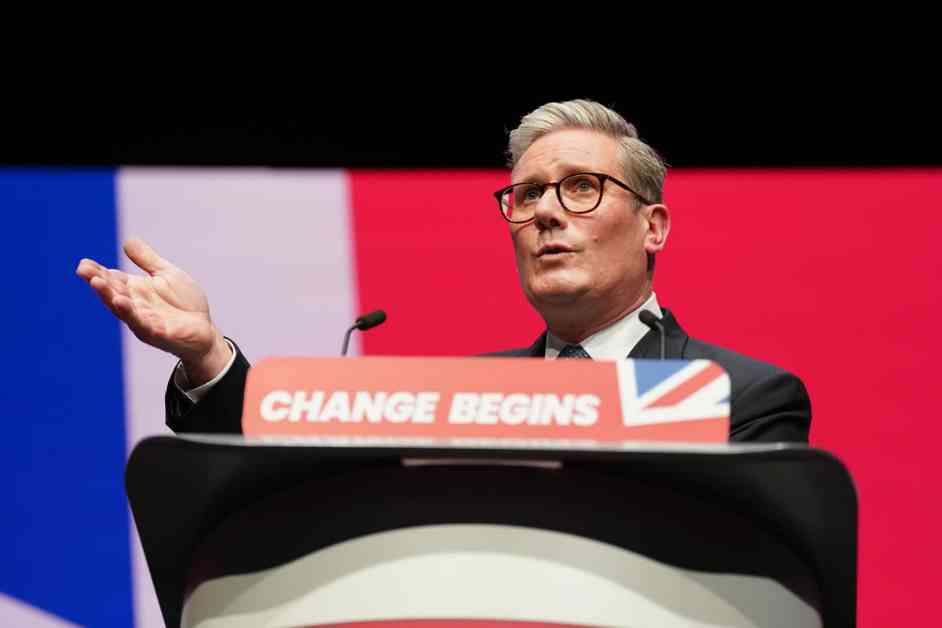Delegates at the Labour Party Conference in Liverpool have voted to reverse the government’s controversial cut to winter fuel payments, dealing a significant blow to Sir Keir Starmer’s leadership. While the motions passed at the conference are not binding, the vote underscores a deep divide within the party over the contentious policy.
In a move announced by Rachel Reeves in July, the government decided to eliminate winter fuel payments for older individuals who do not receive pension credits or other means-tested benefits. This decision was part of a broader effort to address a budget shortfall left by the previous Conservative government. The winter fuel payment, which provides either £200 or £300 to help pensioners with their heating bills, impacts around 10 million pensioners and seven million pensioner households.
The motion to reverse the cut to winter fuel payments, which was passed by a show of hands at the conference, emphasized the need for a different approach to economic policy. It called for an end to fiscal rules that restrict borrowing for investment and proposed implementing wealth taxes to prevent further cuts to welfare programs for working people and pensioners. The motion also suggested taxing the top one percent, equalizing capital gains tax with income tax, and imposing national insurance on investment income.
Unite general secretary Sharon Graham criticized the government’s decision as “cruel” and urged Prime Minister to reconsider. She highlighted the disproportionate impact of the cut on the most vulnerable members of society, while the wealthiest individuals remain unaffected. Green Party co-leader Carla Denyer echoed these sentiments, emphasizing the importance of finding a fairer solution that does not disproportionately burden those in need.
Despite the backlash from within the party and calls for a reversal of the policy, Labour has indicated that they will not change course. A party spokesperson reiterated their commitment to sound fiscal rules and economic growth, stating that tough decisions are necessary to rebuild the country. The decision to uphold the cut to winter fuel payments has sparked further debate and criticism within the party ranks.
Reactions and Criticisms
The decision to reverse the winter fuel payment cut has divided opinion within the Labour Party and beyond. While some members support the move as a necessary step to protect vulnerable pensioners, others criticize it as a misguided policy that targets those who can least afford it. The debate over the winter fuel payment cut reflects broader disagreements within the party over economic policy and social welfare.
Opponents of the cut argue that it unfairly targets pensioners who are already struggling to make ends meet. They point out that the wealthiest individuals in society are not bearing their fair share of the burden, while those on fixed incomes are being asked to make sacrifices. The debate over the winter fuel payment cut highlights the tension between fiscal responsibility and social justice within the Labour Party.
Supporters of the cut defend it as a necessary measure to address the country’s budget shortfall and ensure long-term economic stability. They argue that tough decisions are needed to rebuild the economy and create a more sustainable future for all citizens. The debate over the winter fuel payment cut underscores the challenges of governing in a time of economic uncertainty and political division.
Implications for Keir Starmer
The vote to reverse the winter fuel payment cut represents a significant setback for Sir Keir Starmer’s leadership of the Labour Party. The decision highlights the challenges he faces in unifying the party and defining a clear vision for the future. The division over the winter fuel payment cut reflects broader disagreements within the party over economic policy and social welfare.
Critics of Starmer argue that his failure to reverse the cut to winter fuel payments demonstrates a lack of leadership and a disconnect with the party’s values. They accuse him of prioritizing fiscal austerity over the needs of vulnerable pensioners, undermining his credibility as a champion of social justice. The debate over the winter fuel payment cut has raised questions about Starmer’s ability to lead the party effectively.
Supporters of Starmer defend his decision to uphold the cut to winter fuel payments as a necessary step to address the country’s budget shortfall and ensure long-term economic stability. They argue that tough decisions are needed to rebuild the economy and create a more sustainable future for all citizens. The debate over the winter fuel payment cut underscores the challenges of governing in a time of economic uncertainty and political division.
In conclusion, the vote to reverse the government’s cut to winter fuel payments at the Labour Party Conference in Liverpool has sparked debate and criticism within the party. The decision reflects broader disagreements over economic policy and social welfare, highlighting the challenges facing Sir Keir Starmer’s leadership. As the party grapples with these issues, the future direction of Labour’s economic policy and social welfare agenda remains uncertain.












